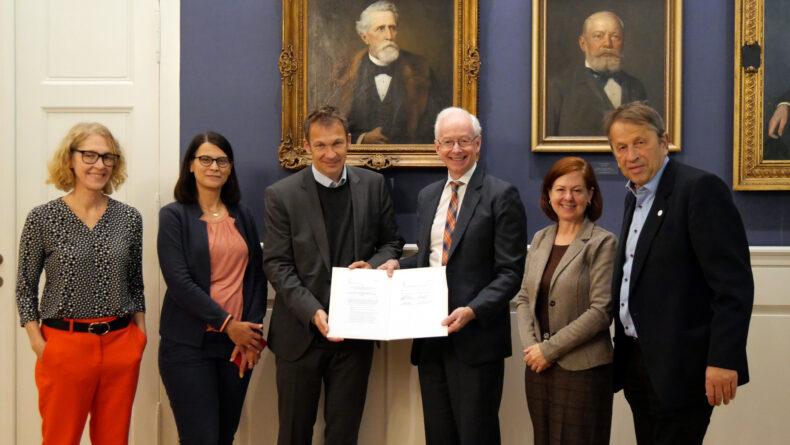Vanderbilt, University of Melbourne expand ties through new research collaborations, exchange programs, office in Washington, D.C.
Vanderbilt University and Australia’s University of Melbourne have taken their academic partnership to a new level – committing $500,000 in joint seed funding over the next two years for research collaborations, expanding exchange programs for students, faculty and staff, and sharing space in Vanderbilt’s Office of Federal Relations in Washington, D.C.
The announcement came at a two-day meeting at Vanderbilt Sept. 15-16 between Vanderbilt officials and University of Melbourne Provost John Dewar and a senior leadership delegation from his university.
Also among the new initiatives is a plan for the exchange of publications and information in all areas and joint sponsorship of conferences, symposia, artistic performances and other gatherings.
A new joint website, www.vanderbilt.unimelb.edu.au, provides information about projects currently underway as well as opportunities for new cooperative ventures.
“I am thrilled with the relationship that Vanderbilt enjoys with the University of Melbourne. It is one of the leading universities in the world and our partnership will strengthen both institutions across a range of areas. Our colleagues from Melbourne are remarkable for their talents, their energy and their commitment to excellence in all that they undertake,” said Richard McCarty, Vanderbilt provost and vice chancellor for academic affairs.
Vanderbilt began its partnership with the University of Melbourne in 2007 when the universities committed to building a new kind of strategic international partnership with a goal of meaningful and long-term collaboration in virtually all academic fields, yielding new discoveries and scholarship, enhanced graduate and professional training, innovative curricula, and sharing information and best practices in administration and governance.
“Similar philosophies toward cross-disciplinary scholarship of our two great institutions are what make this partnership possible,” said Dr. Jeff Balser, vice chancellor for health affairs and dean of the Vanderbilt University School of Medicine. “However, it will be the numerous collaborations occurring across both our campuses that will propel us forward.”
To date the partnership has generated more than 20 active research collaborations ranging from free radical chemistry and intellectual property rights to the reform of mathematical education and water resource management. The joint effort offers different levels of seed funding for promising new joint projects, in addition to the ongoing exchange of researchers and students and a variety of joint administrative initiatives.
“It’s not just that there are lots of opportunities to collaborate between individual researchers,” said University of Melbourne Provost John Dewar. “It’s the fact that there is real commitment from the leadership to set the tone on both sides and a strategic perception that this is important because without that none of this could work. You can have all of the similarities and opportunities to collaborate but the without the leadership it’s just not going to fire.”
The University of Melbourne is a public research university of approximately 25,000 undergraduates and 12,000 graduate and professional students. Founded in 1853, the university comprises 12 faculties (schools) as well as the top medical center in Australia. Melbourne is consistently ranked among the world’s top universities and has taken a leadership role in transforming Australian higher education with its “Melbourne Model.” This visionary curricular restructuring offers six broad undergraduate degrees in Arts, Biomedicine, Commerce, Environments, and Music and Science, as well as a full range of graduate and professional degrees.
Vanderbilt is a private research university of approximately 6,800 undergraduates and 5,700 graduate and professional students. Founded in 1873, the university comprises 10 schools, a distinguished medical center and The Freedom Forum First Amendment Center. Vanderbilt, ranked as one of the nation’s top universities, offers undergraduate programs in the liberal arts and sciences, engineering, music, education and human development, and a full range of graduate and professional degrees.
For more news about Melbourne, visit the Melbourne Newsroom at http://newsroom.melbourne.edu/.
For more news about Vanderbilt, visit VUCast – Vanderbilt’s news network at news.vanderbilt.edu.
Media Contact:
Princine Lewis, (615) 322-NEWS
princine.lewis@vanderbilt.edu


















